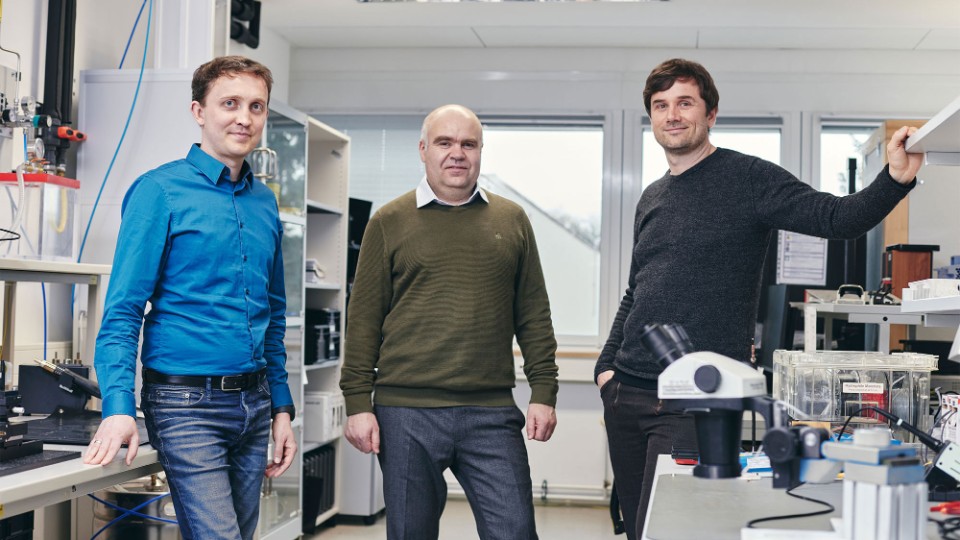Speaker technology – energy-efficient micro speakers for in-ear headphones

Privacy warning
With the click on the play button an external video from www.youtube.com is loaded and started. Your data is possible transferred and stored to third party. Do not start the video if you disagree. Find more about the youtube privacy statement under the following link: https://policies.google.com/privacyThe winners of the Joseph von Fraunhofer Prize for the project "Speaker technology – energy-efficient micro speakers for in-ear headphones": Dr. Bert Kaiser and Dr. Sergiu Langa from Fraunhofer IPMS and Holger Conrad from Bosch Sensortec GmbH (from left to right).
Joseph von Fraunhofer Prize 2023 winners:
Dr. Bert Kaiser and Dr. Sergiu Langa (Fraunhofer Institute for Photonic Microsystems IPMS)
Holger Conrad (Bosch Sensortec GmbH)
In-ear headphones, which are inserted wirelessly into the ear canal, could replace smartphones in the future. A team of researchers from the Fraunhofer Institute for Photonic Microsystems IPMS and Bosch Sensortec GmbH laid the foundation for this with a novel technology for the integrated micro loudspeakers.
In the future, smart in-ear headphones with a direct internet interface could take the place of today’s smartphones: social media interface, shopping mall and entertainment in one. Basic requirements for this are minimal energy consumption and low construction volume, low power consumption at high sound pressure and low production costs. Microelectromechanical systems, or MEMS for short, are ideal for this purpose. Until now, however, the heart of in-ear headphones has been lacking: the suitable speaker technology. The technologies currently on the market are not yet suitable for such demanding applications – whether due to the degree of miniaturization, integration capability, cost reduction, production scalability or power consumption at high sound pressures.
Micro loudspeaker – functional and economical for the first time
Dr. Bert Kaiser and Dr. Sergiu Langa from Fraunhofer IPMS and Holger Conrad, who is now at Bosch Sensortec GmbH, developed the missing heart: mini loudspeakers, made entirely of silicon, that can be manufactured using microelectronics technologies and achieve the required loudness of 120 decibels without high power consumption.
New approaches to design and drive technology
The development succeeded due to two novel scientific approaches: On the one hand, a completely new design of the speaker, which is not based on a vertically deflectable diaphragm as usual, but in which the sound displacing elements are located vertically in a silicon chip. On the other hand, a new drive technology for these elements, the nano-e-drive actuators, which make sound generation possible in the first place. Both innovations can hardly be separated from each other. With the actuator, an electrostatic lever, the researchers solved a fundamental problem: You can implement very large deflections and thus high volumes with it. If you apply a voltage, the lever moves – like an electrostatic muscle. The researchers stacked numerous levers on edge in the chip. The levers form a virtual speaker membrane, however, not on the surface as before but into the volume. When the levers move in response to a voltage, they force the volume of air out of the chip via an outlet opening, thus generating the sounds. This idea was born from numerous discussions with the institute director of Fraunhofer IPMS, Prof. Harald Schenk, as well.
In order to market the loudspeakers, Arioso Systems GmbH was founded in 2019 as a spin-off of the Fraunhofer IPMS and the research work at the Brandenburg University of Technology Cottbus-Senftenberg. Arioso Systems GmbH was, in turn, acquired by Bosch Sensortec GmbH in the summer of 2022 – with the aim of developing cutting-edge products based on MEMS speaker technology for the global mass market Dr. Hermann Schenk also made significant contributions to this success, both in regard to technology and modeling, during his time at Fraunhofer IPMS and later as managing director of the spin-off.